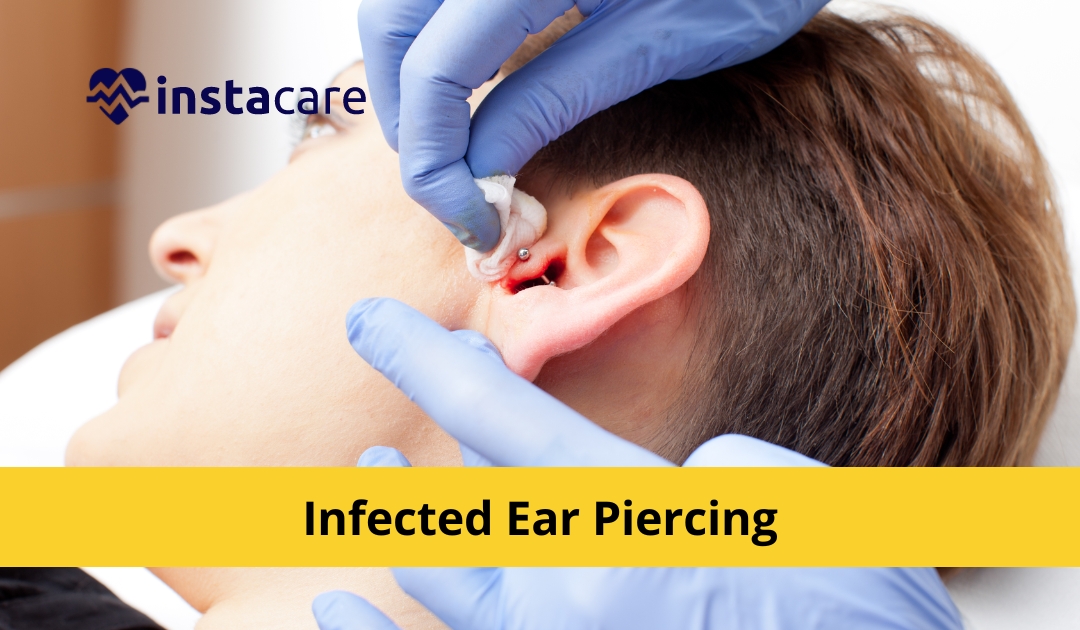If you have noticed redness, swelling, or a discharge coming from one of your piercings recently, it's possible that you may have an infected ear piercing. While not always the case, infections can be common when it comes to body piercings and should be taken seriously.
Knowing more about what causes them, how to treat them, and importantly how to keep them from occurring in the first place is critical for anyone who has been through or is considering getting a body piercing. In this post we will cover all of these topics related to infected ear piercings so that readers can stay informed and take precautionary steps towards avoiding infection.
What is an infected ear piercing?
Ear piercings can be a great way to express yourself and add body art, but it's important to understand some of the potential risks associated with this type of body modification. An infected ear piercing occurs when germs, such as bacteria or fungi, infiltrate an unwashed wound site and begin multiplying and attacking the newly pierced area. This can happen if new piercings are not washed and cared for properly following the piercing process.
Symptoms of infection generally include warmth, redness, pain, soreness, swelling, and discharge in the area around the piercing. If any of these signs are present after getting your ears pierced, it's important to receive medical attention so that the condition does not worsen. Infected piercings, if caught early enough can usually be successfully treated with antibiotics or antifungal creams.
How common are infected ear piercings?
Ear piercing infections are a fairly common occurrence, especially in fresh piercings that haven't had a chance to heal. Even though the majority of piercings heal without complication, it's still important to properly care for them and to be aware of typical signs of an infection.
In general, an infected piercing will cause pain or irritation at the site and present redness, swelling, or pus-like discharge. Antibacterial ointment and proper cleaning can help to prevent infections before they start, but people with infected piercings should seek medical treatment as soon as possible in order to speed up healing and limit the risk of further damage or complications.
Causes of infected ear piercings
Ear piercings can be an attractive accessory, but if not taken care of properly, they can become infected. Bacteria are the most common cause of ear piercing infections, especially if the piercing was done in an unsanitary environment or healing aftercare wasn't followed.
View More: 7 Practical Techniques for Controlling Anger and Reducing Stress for Men and Women
It's also possible for a piercing to get infected due to friction from clothing or sleeping on your side with a recently-pierced ear. Poor-quality jewelry can also cause irritation and lead to infection. To help prevent infection, it's important to follow the aftercare instructions provided by your piercer and make sure to clean the piercing clove at least twice daily for the first few weeks.
Symptoms of infected ear piercings
One of the most common body modifications is piercing the ears, but unfortunately, it can sometimes lead to unexpected side effects. Infected ear piercings can cause extreme discomfort and even pain. The signs of an infected ear piercing may include redness and swelling around the pierced area, pus-filled discharge, tenderness to touch, or a fever.
If you think your ear piercing is infected, speak to a doctor immediately because it could lead to even more serious health issues if left untreated. Take care of your piercings and make sure you are following the correct aftercare instructions; otherwise, an infection may occur.
Complications of infected ear piercings
Infected ear piercings can cause complications that range from mild to severe. Common symptoms of an infected ear piercing include redness, pain, swelling, and discharge. If left untreated, the infection can spread to other parts of the body and become systemic.
In extreme cases, systemic infections can be life-threatening as they affect vital organs and require intravenous antibiotics. To prevent a piercing infection from worsening, it is essential to seek medical attention and follow their instructions for proper treatment. Additionally, keeping the area around your piercing clean, changing jewelry regularly, and avoiding putting pressure on the fresh piercing will all help lower your chances of infection.
Diagnosed of infected ear piercings
Ear piercing is a popular way to add style and personality to one’s look, but unfortunately, it can come with risks. It is quite common for ear piercings to become infected, resulting in redness, pain and swelling around the piercing site. In some cases, the infection can be serious enough that medical intervention is required.
To avoid infection when getting an ear piercing, it is important to choose a reputable parlor as they are likely to use sterile instruments and quality jewelry. Also, don’t forget to keep the area clean by following the aftercare instructions provided at the time of your piercing. If you notice any adverse effects such as increasing redness or discharge, seek medical attention right away. Remember: safety always comes first!
Treatment of infected ear piercings
If you have an infected ear piercing, it's important to take proactive steps to get proper treatment for it. Often, treating an infected piercing may mean avoiding the use of over-the-counter ointments so as not to trap any bacteria or further spread the infection. To reduce swelling and pain, a cold compress can be used several times a day. Proper cleaning is essential which means gently washing with soap and water and drying after daily showers or swimming.
Additionally, reducing time in chlorinated water or removing jewelry while swimming can help minimize the likelihood of infection. If home remedies are not effective after three days see a medical professional as antibiotics or other medications might be necessary. Taking care of your piercing is key to preventing infections so treat yours accordingly!
How can i prevent a pierced ear infection?
Ear piercings can look great and be a fun accessory, but like any piercing, it is important to take proper care of the area in order to prevent infections. To help decrease the chance of infection, it's best to avoid handling or touching the area with dirty hands. Doing so could potentially introduce bacteria. Additionally, sleep on your back instead of on your side or stomach as this can cause the earring to become tangled and irritated.
When showering, you should try to keep your pierced ears dry or use a waterproof cover over them. Be sure to also clean the pierced area daily with sterile soap or saline solution and dry with a clean cloth; this will help keep bacteria away. Lastly, make sure that you are using professional grade jewelry material as cheaper rings and studs could be contributing to an infection due to poor quality materials and inferior clasps that allow bacteria more opportunity to enter into the skin. Taking these steps will significantly reduce your chances of an infection, so get those piercings done responsibly!
How you can get a piercing infection?
Many people enjoy getting body piercings, however it is important to be aware of the risks associated with this activity. Getting a piercing infection is surprisingly common and can be caused by many different factors such as unsterilized tools and jewelry, poor after-care practices or a weakened immune system due to health issues like diabetes or hiv.
View More: How To Manifest Good Health Through Mindful Practices
To help prevent an infection from developing, always make sure to bring your own tools and check to see that the establishment is following strict sterilization protocols. Additionally, take extra care when caring for your piercing at home; avoid swimming for at least the first few weeks and keep the piercing clean with saline solution. If you notice swelling, excessive pain or discharge in or around the pierced area contact a medical professional immediately.
Treating the infection at home
Treating an infection at home can be a safe and effective process if done correctly. It is important to identify the type of infection as each requires different action. If the infection is bacterial, it can often be treated with antibiotics, but if it is a virus, then medicating is unlikely to help and a wait-and-see approach may be best. Additionally, proper wound care needs followed to ensure the wound does not become worse or spread.
This includes cleaning and drying the wound; covering it when required; and seeking medical advice from a professional if due diligence has been applied and the infection is not improving or getting worse. Overall, understanding how to properly treat an infection at home is essential in order to avoid further complications.
Conclusion
Most cases of infected ear piercings can be treated at home with over-the-counter options, but if you think your infection is serious, make sure to see a doctor. With a little extra care during the piercing process and regular cleaning afterward, you can decrease your risk for developing an infection. Do you have any other tips for preventing or treating infected ear piercings? Share them in the comments below!
Please book an appointment with the Best General Physician in Lahore, Karachi, Islamabad, and all major cities of Pakistan through InstaCare, or call our helpline at 03171777509 to find a verified doctor for your disease.










